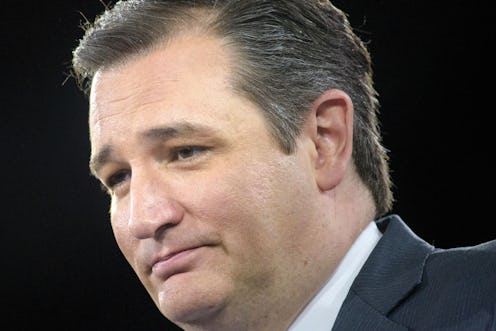News
Cruz's Double Pressure On Muslim Americans
As the world grappled with the tragedy of Tuesday's Brussels attacks, some Republican presidential candidates quickly made frightening proclamations against Muslim communities. Texas Sen. Ted Cruz declared it necessary to monitor Muslims, specifically stating a desire to "patrol and secure Muslim neighborhoods." It was a sentiment quickly echoed by GOP frontrunner Donald Trump.
Thankfully, the backlash against these candidates was swift — at least on Twitter. The hashtag #MuslimNeighborhood began trending Tuesday night. The Internet was soon flooded with tweets about what Cruz and his supporters could expect to find in their local Muslim neighborhoods, from family gatherings to Muslims serving their country. And while these tweets of support to challenge Islamophobic stereotypes are well meaning, many of them also illuminate the pressure Muslim Americans are under today to constantly prove they are not terrorists.
In fact, the tweets fed into the sometimes constraining narrative of the “good Muslim." The "good Muslim" has different shades of meaning, depending on the situation in which it is used. It can refer to how devout one is within the context of the Muslim community, but it sometimes refers to, basically, being a non-terrorist. The narrative of the “good Muslim” is intended to signify how well-behaved and non-threatening and valuable to their communities Muslims can be — with the implication being that they're not like, you know, those “other” Muslims.
It is not unrelated to the pressure on black people to be “twice as good," a phrase referring to the unrealistic standards by which racist whites will judge their behavior. As Ta-Nehisi Coates wrote in The Atlantic:
"Racism is not merely a simplistic hatred. It is, more often, broad sympathy toward some and broader skepticism toward others. Black America ever lives under that skeptical eye. Hence the old admonishments to be “twice as good" ... An equality that requires blacks to be twice as good is not equality — it’s a double standard."
The phrase "good Muslim" is likewise sort of intended to be inspiring, but actually means that an entire demographic has an enormous burden on them at all times. There's the implied responsibility — and therefore stress — they must drop whatever they’re doing to demonstrate their good behavior and excellent character at any time.
No one should feel pressured to prove to the world that they’re a saintly superhuman simply because of something religious extremists did 4,000 miles away, but I believe that’s the reality Muslims in this country face.
The #MuslimNeighborhood hashtag is certainly born of pride, but also, I imagine, out of fear from Muslims that they will face physical threats and harm because of the conception that they are inherently dangerous, violent people. In the wake of the Brussels terrorist attacks — which Cruz chose to spin into a campaign pitch in addition to his remarks about patrolling Muslim neighborhoods to ward off radicalization — I suspect that fear will, unfortunately, rise again.
The more #MuslimsNeighborhood tweets you look at, though, the more you do see a different narrative running alongside that of the “good Muslim.” For as many tweets about Muslims either excelling in their communities or being mild-mannered patriots, there are also those about lazy Sundays, “mama and baba” shops, kids doing homework, and the difficulty of distinguishing a discrete “Muslims neighborhood” from any other. After all, Muslims neighborhoods are American neighborhoods.
These other tweets take a tongue-in-cheek approach to the pressure Muslims in the United States often face to exhibit unflagging excellence. To me, something about these tweets feels happier — less frenzied.
Cruz's comments about patrolling Muslim communities were not only terrifying (and almost certainly unconstitutional if executed), but also revealed how disturbingly little he knows about Muslim Americans. Apparently, the Texas senator doesn't realize that Muslims don't exist in a segregated vacuum. They live, hang out with their friends, watch Netflix, and raise their families wherever the rest of us do.
